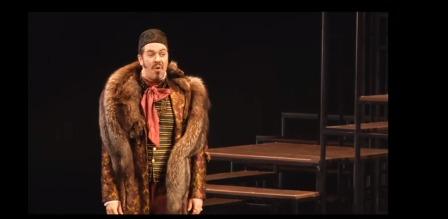On of the most famous lines from Shakespeare’s “Measure for Measure”, now playing at Pennsylvania Shakespeare Festival at DeSales University in Center Valley, PA, is "Some rise by sin, and some by virtue fall,” a line delivered in this show with special emphasis by Wayne Turney as Escalus.
The play does not live up to the line since it rises by its virtue and falls from little of its sin.
Most of the sin in this show is the disconnect between the language of Shakespeare and my much newer understanding of English. The syntax makes Shakespeare hard to follow, and this places a tremendous burden on the cast. 
This cast exceeded my expectations and delivered a fine performance that was built on the acting of fine, a professional cast supported by the theater program at DeSales University at its best.
My previous experience with Shakespearean theater has ranged from a tedious, miscast “Antony and Cleopatra” to a most charming “A Midsummer’s Night Dream.” This “Measure for Measure” extended my Shakespearean experience to include “delightfully unforgettable.”
Vincentio - the Duke of Vienna turns over the responsibility for managing the Duchy to Angelo who is advised by Escalus. Vincentio then disguises himself as a monk--- after all, what is a Shakespearean comedy without at least one or more disguised characters. Angelo sentences Claudio to death for getting his betrothed pregnant.
His sister, a novice in a local convent, approaches Angelo to beg for her brother’s life. He suggests he will do so if she will join him in the boudoir.
She explains the situation to her brother with much sturm und drang, while Vencentio, disguised as a monk, listens in. Vincentio decides to help and offers to substitute Mariana who is Angelo’s betrothed although he refused to marry her because her dowry was lost in a shipwreck.
Mariana replaces Isabella which satisfies Angelo who is not aware of the substitution.
Angelo orders Claudio to be killed anyway. Vincentio arranges for the execution to be stopped and then has the Provost deliver the head of another prisoner to Angelo.
There are the usual end of a comedy hi-jinx, and Angelo marries Mariana, Claudio is restored to his sister and his fiancé, and Vincentio proposes to Isabella.
The reason why this show was so enjoyable is a perfect storm of great things that came together. Beginning with the acting, every character was compelling and believable. Greg Wood as Duke Vincentio was like a comfortable chair providing just the right support in just the right way so you are never jarred out of the dream or allowed to lapse into a soporific stupor.
I saw his performance as Cyrano, where he dominated a crowded PSF stage with acting I still recall with pleasure. Vincentio is not as strong a vehicle to me, but he was just as compelling.
I have put him on my very short list of people I will go out of my way to see.
Blake Ellis as Angelo was like quick sand: It looks harmless and even charming, yet it draws you in despite your resistance. Ellis played a neurotic villain whose inner demons knocked my daylights into nightlights. I do not know if he or the director, new to PSF, Fontaine Syer, thought to have Angelo be a self-flagellant, but this stroke of genius will continue to live in the nightmares of the audience. He developed a despicable villain you wanted to treat like a cute puppy.
I call that acting.
Erin Partin was a petite, blond Isabella dressed in a white habit. Her emotional palette ranged from her granite-hard refusal to Claudio’s request she sacrifice her purity to save his life to a timorous withdrawal from the onslaught of Angelo’s relentless assault.
The dramatic journey wove its way through a comedic landscape constructed by the supporting actors and an imaginative set. The comedic highlights included the performance of Brad DePlanche as the bawd Pompey. My impression is that he won the number-of-laughs-from-the-audience contest.
My other favorite comedic character was Henry McDaniel as the constable Elbow whose idiosyncrasies provided just the right comedic tone.
The remainder of the cast was just as crucial to the success of the show.
The play took place on and around a large jungle gym of iron steps, rails, bars and working doors. It was placed on a large turntable that rotated for scene changes.
The various views came to represent streets, the jail, the Duke’s castle, and a nunnery in our minds. Bob Phillips created the most imaginative, script-relevant stage design that I have seen in a long time.
The final piece of the puzzle was the fact that I could understand virtually every word spoken on the stage. I may not have comprehended all of the syntax, but I was never denied the chance to do so because I could not understand the diction.
“Measure to Measure” continues through August 4th.
